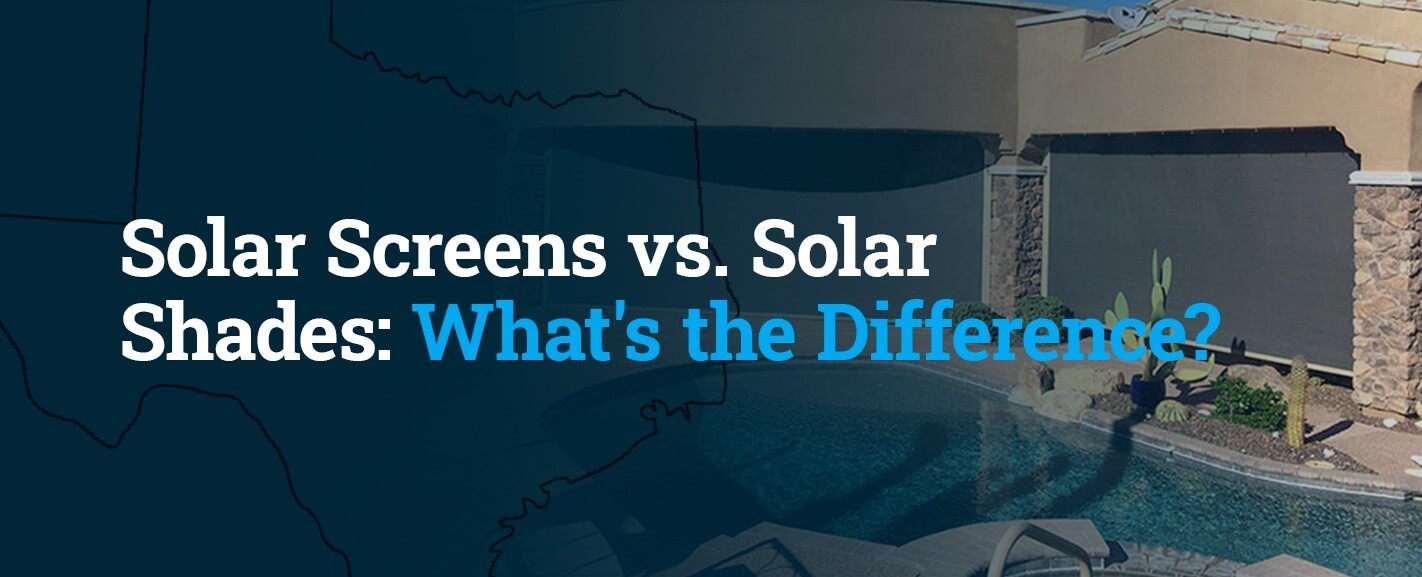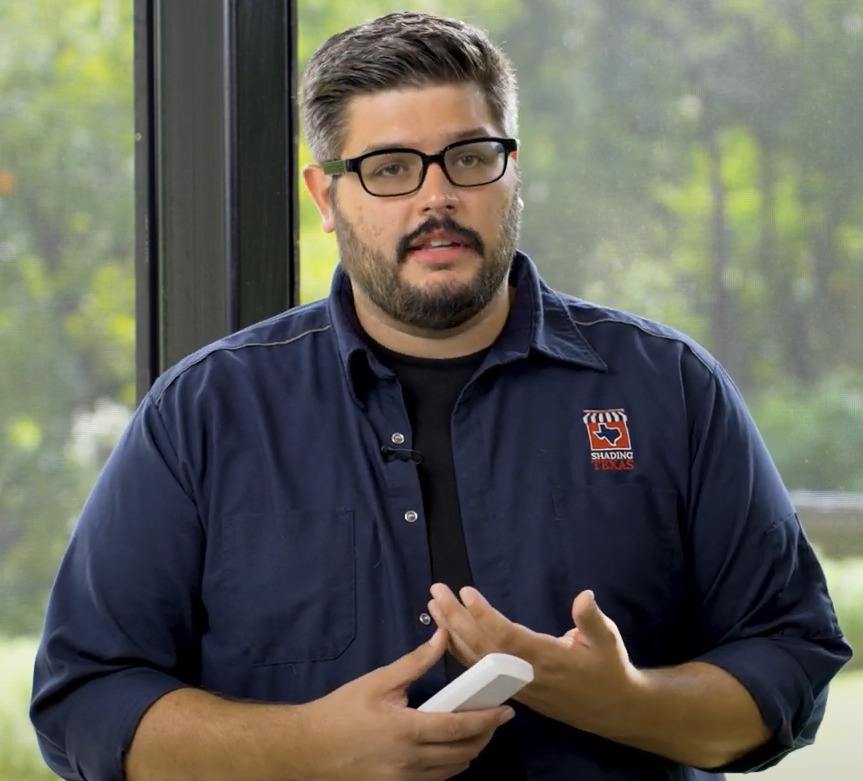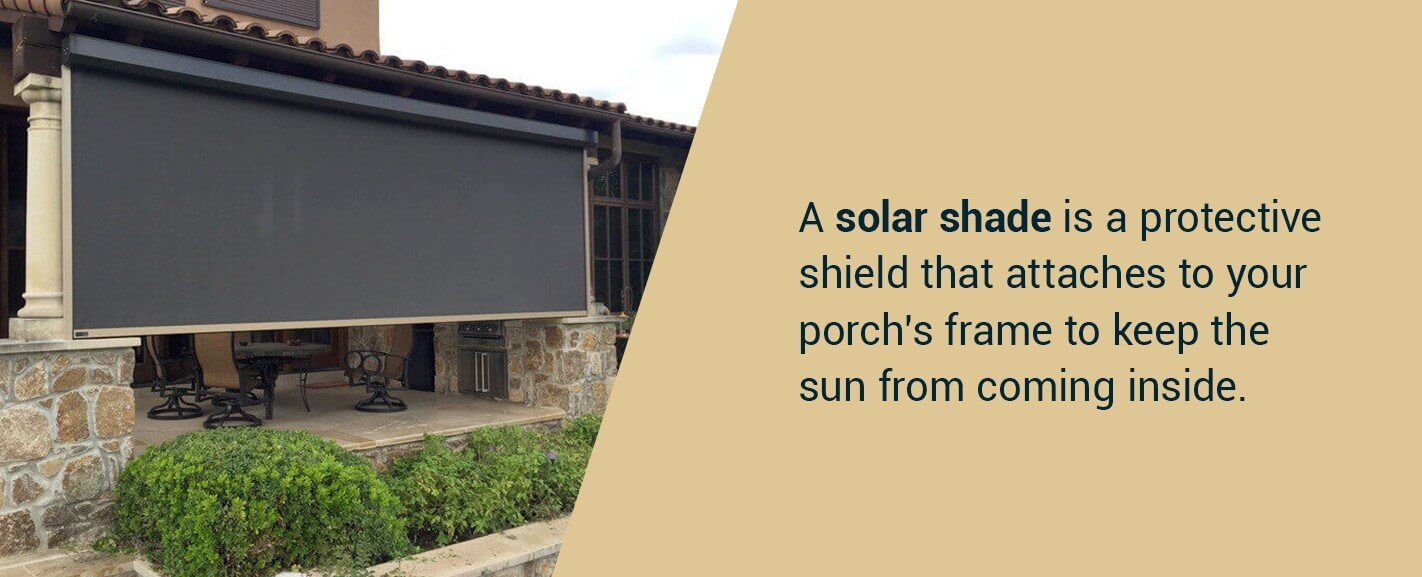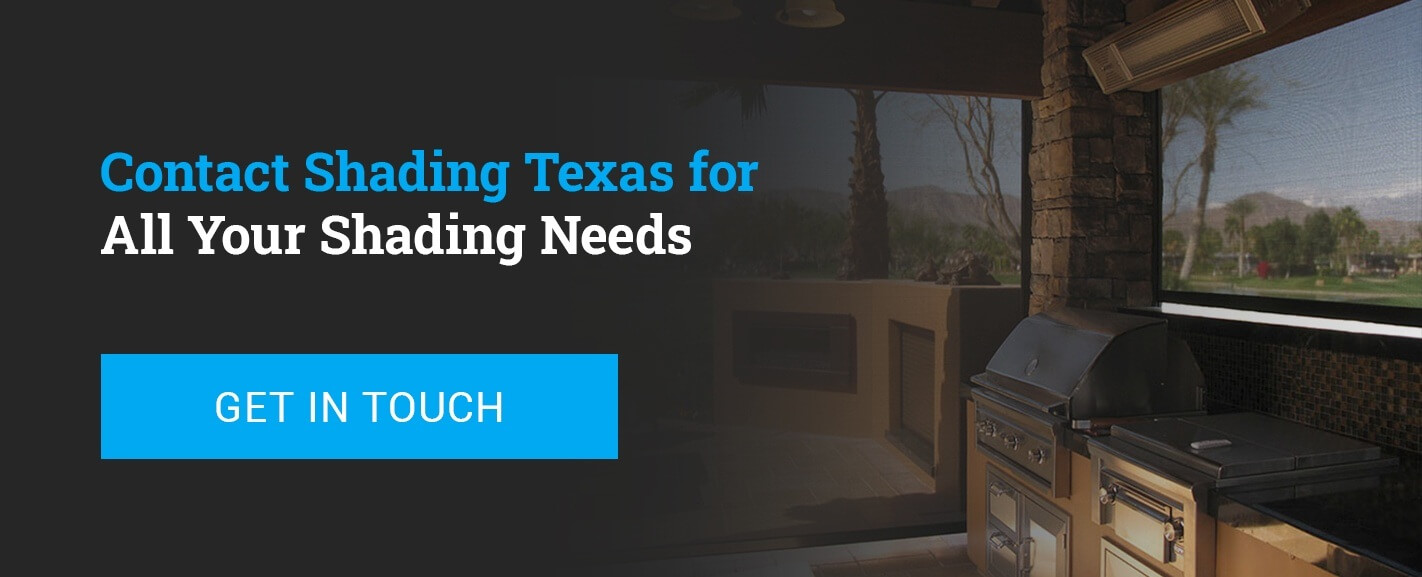
Your porch is an excellent place to admire the view or spend time with family, but the hot Texas sun can get uncomfortable in the summer. If you want to keep cool on your porch, consider solar screens or sunshades. Solar screens mount onto your porch framing to keep sunlight out of your property and give you more privacy. Sunshades also mount onto your porch, but instead of staying in one place, they open and close, allowing you more control. Solar screens and solar shades can both provide relief from the sun, but which one is better for your porch? This guide can help you figure out whether to install solar screens or shades.
What Is a Solar Screen?
Solar screens are dark panels that fit in the openings of your porch and deflect sunlight to reduce glare. Their design allows you to see outside, but it obstructs the view into your living space. Consider the pros and cons of installing sun screens on your property.
Pros of Solar Screens
Here are some of the benefits of solar screens and how they can add value to your property:
- Insulate your porch: Solar screens can reduce your porch’s temperature by several degrees to make it more pleasant to be outside. Since less heat is coming near your house, you might even save money on air conditioning over the summer.
- Reduce glare: Besides making it hard to see outside, ultraviolet (UV) rays from the sun may discolor your patio furniture and flooring. Solar screens can mitigate the harmful effects of sunlight to help you enjoy your outdoor property.
- Give you privacy: Solar screens allow you to see outside your porch, but people passing by can’t see inside. By installing sunscreens, you can have a family gathering with privacy from your neighbors.
- Adjust to your preferences: You can choose from various options to complement your porch’s design. You can also remove solar screens in the winter if you don’t need them anymore.
Cons of Solar Screens
You may also want to think about the potential drawbacks of installing solar screens on your property:
- Partially obstruct the outside: The tightly woven solar screen fabric may slightly block your view of the outside.
- Darken your porch: Since sunscreens don’t let as much natural light inside, they can make your property feel darker.
- Get damaged from the weather: If the manufacturer didn’t fit your screens securely, they could tear from harsh winds, rain or snow.
- Can be difficult to move: Since they block heat, you might want to take your solar screens down in the winter to warm up your living space. However, once they’re in place, they can be challenging to remove and mount back on your porch.
How Do Solar Screens Work?
Solar screens contain dark, tightly woven mesh that goes outside your porch or patio’s frame. The mesh’s pattern deflects the sun’s brightness to prevent glare and UV damage on your porch or patio. As a result, solar screens can block a significant amount of heat from warming up your property. Instead of completely removing sunlight from your porch, they only take away the sun’s harmful effects to make it more pleasant to be outside. Solar screens also don’t block your view entirely, so you can still enjoy the natural beauty around you.
What Is a Solar Shade?
A solar shade is a protective shield that attaches to your porch’s frame to keep the sun from coming inside. Unlike a solar screen, it opens and closes to give you more control over how much sunlight you allow onto your porch. It’s available in various colors, materials and sizes to meet your design preferences. It features a coated, tightly woven fabric that blocks heat and glare.
Pros of Solar Shades
Consider the benefits of sun shades to find out if they’re suitable for your porch:
- Protect against UV rays: The material and pattern used for the solar shade fabric prevent UV rays from coming through and damaging your porch furniture and floors. As a result, you can enjoy a more comfortable temperature outside and a reduced risk of fading.
- Optimize your views: Even though patio shades are opaque, they allow you to see out of them. Since you can open and close them, you can also control your porch’s brightness and privacy levels.
- Unlimited design options: You have various fabrics and opacity options for finding the best solar shades. You may want to get dark colors that can reduce glare and provide a better window into the outside. Light colors absorb heat and make the porch brighter, but they might make your view a little hazy.
Cons of Solar Shades
Here are some of the drawbacks of installing solar shades:
- Don’t provide much privacy: Depending on the fabric you choose for your solar shade, you may allow outsiders to see into your property when you turn on your porch light. If you’re installing these shades somewhere visible to the public, you might not mind your neighbors viewing in.
- Let sunlight in through spaces: Even if you choose solar shades with high light protection, the gaps between the shades and frame may allow sunlight into your property.
- Inhibit light and airflow: The fabric used to make solar shades sometimes darkens your outdoor living space. Since solar shades can also control the wind around your porch, the air might become stuffy if you keep them down for extended periods.
How Do Solar Shades Work?
Solar shades block heat by deflecting the sunlight coming through your porch. Their openness percentage indicates how much light and UV rays the shade filters, with a lower number meaning it’s more opaque. If you want to protect your porch from UV rays and regulate its temperature, you should look for a shade with a low openness factor. If you want to allow in more natural light, you can get a solar shade with a high openness factor.
Which Is Better: Solar Screens or Solar Shades?
Solar screens and ,shades can both control the sunlight around your porch. Think about these factors to find out which one will work better for your property:
- Installation: You should hire a professional to install your solar screens or shades for the best results. In general, if a product is easier to install, it usually costs less. Solar screens tend to be easier to install because they mount on your framing and custom fit to your porch. Solar shades are slightly more challenging to install because they often require more components.
- Budget: Porch screens and shades are available in various materials to fit your budget. Solar shades tend to be slightly more affordable than solar screens, depending on the fabric you choose. Durable mesh tends to cost more, but it offers more protection from the sun.
- Year-round use: Think about whether you want to use your porch protection all year long or only in the summer. Solar screens are more convenient to remove from your porch framing, so you can take them off if you don’t plan on using them in the winter. However, solar shades are durable for year-round use, and you can open or close them when you need them.
- Retractability: You can retract your solar shades with a remote or your phone, using them only when you need them. Keep in mind that opening and closing your porch coverings can make your property warmer and more vulnerable to UV damage.
Contact Shading Texas for All Your Shading Needs
At Shading Texas, we provide awnings, shades and screens to help make your property more pleasant throughout the year. Whether you want to keep sunlight out of your home in the hot summer or control the wind around your patio, we have what you need to enjoy the outdoors again. For more information about what we offer, you can speak to us online or call 512-264-1500.

Matt Pierce has been working in the solar shade industry for over 15 years, providing sun protection in the extremes of Alaska and Texas. His dedicated team at Shading Texas will get your the sun solutions you need to enjoy your patios and homes for years to come by blocking out bugs, sun, wind, and rain!


